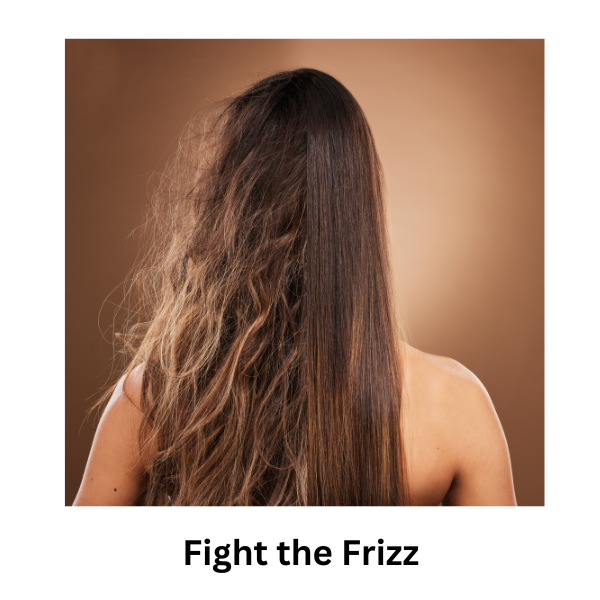The word that popped out of your question was ‘naturally’.
The whole area of what is natural and what isn’t does depend on the views of the person using it as there is no definitive list of definitions.
I don’t think the oils are going to stop your hair looking ‘puffy or frizzy’ and they will weigh it down, which some people want. Maybe use an ester instead, like coco-caprylate-caprate - from coconut oil, but not heavy or greasy.
I think you need to trap more moisture into the hair shaft. Starting with something derived from chicory root, which is biodegradable, a glucose/fructose polymer that I use is Inulin. This is a humectant, that will draw water into the hair and it is conditioning too. Phytokeratin (vegan alternative to animal keratin) can also add moisture and give hair a bit more elasticity. They won’t radically improve the frizziness, as you need it to be ‘sealed into’ the hair, to continue to do what it does. But I think they may help. Hydrolised oat protein can do the sealing-in bit. This doesn’t work as well as silicones (in my experience), but it certainly worth trying, I do use this too.
Silicones are likely to help significantly, but they are made in a lab, so are synthetic. There have been reams written on the potential problems with them. Briefly, they can cause irritation, but in my experience, most things can and just because it comes out of a flower, doesn’t mean it won’t cause problems. I spend much time extracting nice things out of plants and I have have long lists on potential hazards, safe limits, people who should avoid them etc. That said, dimethicone or cyclomethicone, are commonly used, effective and are large molecules, so unlikely to be absorbed by skin. Some people believe that they cause ‘build-up’ on hair as it doesn’t rinse away effectively - I haven’t found this to be so. Formulators are only permitted to use silicones in an amount considered safe and it is constantly under review. Silicones will have some negative environmental impact, but probably not as much as the plastic bottle all the ingredients mentioned above are likely to come in.
Quats are also good at de-frizzing hair. Cetrimonium or behentromonium chloride (quaternary ammonium salts (quat)) are very good for damaged hair and reducing static. Damaged hair gives off a negative charge and these are attracted to that, so they hold on to just the damaged bit, and so don’t affect hair that doesn’t need it. There has been some concerns about Cetrimonium chloride due to, I think just one study, which has resulted in a restriction of it’s use to 0.25% in leave-on products or 0.1% as a preservative (it’s a clever one; it does lots of things). But it is deemed safe to use on hair at up to 2%. In my experience, 0.5% will have a noticeable effect. You will find lots and lots of ‘conversations’ about the use of this, I will let you make up your own mind.
Personally, I use mainly botanical extracts and work hard to ensure my products reach their final destination with the following criteria ticked: having had none of the ingredients tested on animals, with as little environmental impact as I can ensure and using the best possible ingredients for the intended purpose. I use plant-derived ingredient wherever possible. Sometimes, lab-made ingredients work better, but labs are often putting together very similar, even identical molecules to those found in nature - a molecule is a molecules, wherever it was born! I like Perry Romanowski’s (Chemists; Corner/ IFSCC) take on this subject - he often reminds us that the Royal Society of Chemist is still offering a one million dollar reward, to anyone who can make a chemical-free formulation! Water is a chemical. It is very important that those of us in the formulation world know what we mean by ‘natural’, and use clearer, more honest terminology, as consumers need better guidance.
I apologise for the slight ‘natural’ rant - My advice is to choose something that is likely to work and be responsible where you can. I’m afraid ‘natural’ is as much a marketing term as it is description - I pay as much as ten times more for an ingredient that is wholly plant-derived, sometimes I believe it is worth it. Often it doesn’t do what I need it to do. It must be safe and it must be effective. Otherwise consumers will tip it away and go back to using something unsustainable, unethical and ecologically dangerous just because they miss the lovely big bubbles!
442 views

